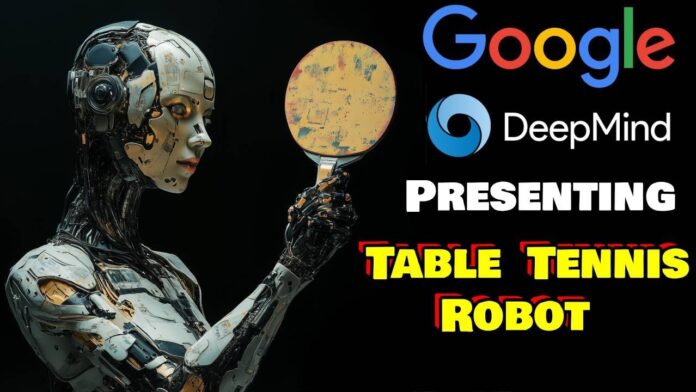DeepMind’s latest innovation demonstrates impressive table tennis skills, defeating human players and inspiring discussions about a future robot Olympics
DeepMind, Google’s AI research subsidiary, has unveiled a groundbreaking robot that has taken table tennis by storm. The robot, equipped with amateur-level skills, managed to outplay human opponents in 13 out of 29 matches, showcasing its advanced abilities on the ping-pong table. This impressive performance, achieving a win rate of nearly 45%, has drawn significant attention from both tech enthusiasts and the general public.
The robot, which was programmed to handle table tennis using a combination of cameras and motion capture technology, excelled particularly against beginner-level players, defeating them with ease. It also achieved a 55% success rate against amateur-level opponents. Despite these impressive results, the robot still falls short when competing against professional players, who remain out of its reach for now.
The demonstration of the robot’s skills has led to widespread excitement and calls for the establishment of a Robot Olympics. The idea of a competitive event featuring the world’s top robots, including humanoid machines, quadrupeds, and mechanical arms, has captured the imagination of many. Observers have been awed by the robot’s ability to outmanoeuvre its opponents, even those with considerable skill, and have expressed enthusiasm for further showcases of robotic prowess.
Pannag Sanketi, a senior staff software engineer at DeepMind, expressed surprise at the robot’s performance. “Even a few months ago, we projected that the robot might struggle against new opponents,” he noted. “The system certainly exceeded our expectations. The robot’s ability to out-maneuver strong opponents was mind-blowing.”
The technology behind the robot involves sophisticated algorithms and real-time data processing. Using a pair of cameras, the robot tracks the ball’s trajectory and the opponent’s movements, allowing it to adapt its strategy dynamically. The system continually feeds data from each match into simulations to refine its tactics, much like how human players improve with practice.
However, the robot is not without its limitations. It struggles with fast shots, low balls, and shots near the edge of the table, which can disrupt its game. Despite these challenges, the robot’s ability to learn and adapt represents a significant leap forward in the integration of AI in sports and other human activities.
The excitement surrounding the robot’s performance highlights the growing interest in robotics and AI technology. Several companies are exploring the potential of robots to assist in various sectors, from domestic chores to industrial applications. For instance, the Chinese company DEEP Robotics is developing a bionic dog designed to help with shopping and fishing, while BMW’s Figure O2 is a humanoid robot created to aid in car manufacturing.
The success of DeepMind’s table tennis robot is seen as a milestone in the quest to create robots capable of engaging in human-like activities and competitions. As technology advances, the potential for robots to participate in various forms of entertainment and sports continues to grow, fueling imaginations and sparking discussions about the future of AI and robotics.
Analysis:
Political: The rise of advanced robotics and AI technologies like DeepMind’s table tennis robot brings political implications related to regulation and competition. Governments may need to address issues surrounding the ethical use of AI in sports and other public arenas. Additionally, discussions about a Robot Olympics could influence international policies on technology and innovation, fostering cross-border collaborations and competitions.
Social: The development of robots capable of playing sports reflects changing societal attitudes toward technology. As robots become more integrated into everyday life, public acceptance and enthusiasm for AI advancements grow. The idea of a Robot Olympics also taps into societal fascination with futuristic technologies and competitive events, highlighting a shift in how people engage with and view robotics.
Racial: Although the event does not directly address racial issues, the advancement of robotics and AI has the potential to influence discussions about diversity and inclusion in technology. As robots and AI systems become more prevalent, ensuring equitable access to and representation in these technologies will be important for promoting fairness and addressing disparities.
Gender: The success of DeepMind’s robot underscores the importance of diversity in technology development. The involvement of diverse teams in creating and programming robots can impact how these technologies are perceived and utilized. The broader implications for gender in tech will depend on how inclusivity and representation are addressed within the field of robotics and AI.
Economic: The rise of robots with advanced capabilities has significant economic implications. Industries are increasingly investing in robotic technology to enhance productivity and efficiency. The success of robots like DeepMind’s table tennis machine could drive further investment and innovation in robotics, impacting job markets and economic growth. Additionally, the potential for robots to participate in entertainment and sports opens new avenues for revenue and business opportunities.
